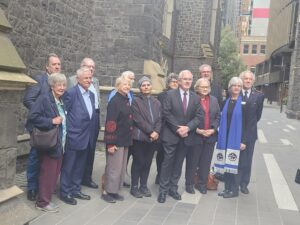
Jenan Taylor
8 November 2022
The Melbourne diocese must make significant changes in its approach to children and youth ministries for them to remain viable, leaders say.
October’s Melbourne Synod ratified a proposal to establish a Children and Youth Ministry steering committee, and legislation for a permanent standing committee.
Mover of the motion, the Reverend Dr Graham Stanton said that without a culture shift children and young people’s ministries were unsustainable.
A review conducted by the Children and Youth Ministry Working Group, established at last year’s synod, found that support for such initiatives was precarious.
The working group also concluded that the weak state of many of the diocese’s ministries for young people would decline even further without stable governance.
The director at Ridley College Centre for Children and Youth Ministry, Dr Stanton said the motion’s aim was that the committees would provide support for the diocese’s children and youth ministry consultant and fix the governance structures.
He said although the motion was about culture changes at the administrative level, for a shift to happen there also had to be grassroots changes.
At the same time, structures had to be put in place to enable those ground up changes to occur, Dr Stanton said.
Read more: Whose job is it to fix the youth ministry?
He said without stronger structures, and without centralised support, then the sort of grassroots changes and activities that were needed would not have a context in which to thrive.
But he said culture change would take time, and to view it as achievable through the delivery of one or two kinds of children’s or young people’s initiatives, was unrealistic.
“It pushes us into short term attraction or ministry strategies that actually do very little to ensure that young people are given genuine opportunities to engage with Christian faith and come to a relationship with Jesus,” Dr Stanton said.
Melbourne diocese’s Children and Youth Ministry consultant Brian Holden said he hoped that a steering committee would help the diocese be more strategic in its approach to children and young people.
His vision was that it would also enable more funding and resources for projects, and research to be carried out.
“By allowing a group of people to seriously consider what it means to have a future with children and young people, we can actually look at things and look at solutions in a much larger way rather than purely being reactive,” Mr Holden said.
City on Hill Geelong youth minister the Reverend David Chiswell said under-resourcing of children’s and youth ministers, and financing were the constant challenges being faced by many churches.
Mr Chiswell said that even if there was financing, where were the vocational ministers of the next 10 to 20 years to staff the initiatives.
Culture played a significant role, he said.
Mr Chiswell said in his graduating class at Ridley, there were perhaps only two people who had seriously considered that youth ministry was part of their role.
He said part of the problem was that in Melbourne no one seemed able to conceive of themselves as a full-time youth minister.
A lack of vocational training to that end was one reason, but the perspective of many churches was another.
Read more: Ministry training event to offer skills, joy and encouragement
“Many talk it down as a kind of lesser ministry, so that it’s the sort of thing you do and then graduate from,” Mr Chiswell said.
“In my own experience, even if a [lay] youth minister doesn’t feel like that, the reality is if they want to get ordained or find full time employment, or get theologically trained, then it’s like youth ministry is not the best place for them to spend time. There is a view that the best people should not be sent into youth ministry.”
St Thomas’ Burwood youth minister, the Reverend Joshua Millard said part of the problem in Melbourne was that many churches had no idea how to start growing their youth numbers.
Mr Millard said one of the stranger aspects of the current culture was that the important task of children and youth ministry was assigned, with no real resources, largely to volunteers.
They are usually given groups of teenagers to lead in a Bible study or youth group and expected to know what to do, or it is assumed that they know.
“It’s not the case. You have to have resources. We’re like teachers needing to build a curriculum, but without the training to do so. And even if you have resources, you have to know what’s workable,” Mr Millard said.
“I’m not too involved in children’s ministry, but youth ministry is a specialty, so it requires more, not less training than what vicars get.
“We’re dealing with an age bracket that has developmental, sociocultural and psychosocial challenges that other people in our congregation don’t have. They’re sitting right on the edge of culture and are at an important stage in life, so we need the training and the resources to help us figure out how to do the best we can for young people.”
For more faith news, follow The Melbourne Anglican on Facebook, Twitter, or subscribe to our weekly emails.








One Response